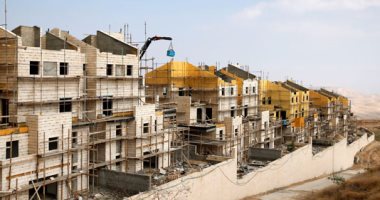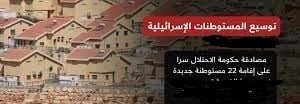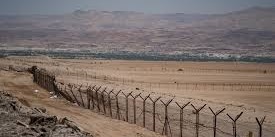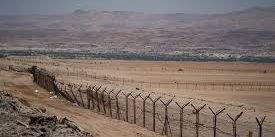By: Madeeha Al-A’raj
The National Bureau for defending land and resisting settlements ( nbprs ) stated in its latest weekly report , that Israel’s settlement plans, especially, in East Jerusalem continue to impose a de-facto position on the ground so as to prevent the establishment of a viable Palestinian state, as the Local Planning and Building Committee at the Occupation Municipality approved the confiscation of public buildings, roads, thousands of new settlement units, and 10 compounds and 38 public settlement units in a new settlement called “Givat Hamatos” in the south of the occupied Jerusalem, including temporary homes “caravans” inhabited by Ethiopian Jewish immigrants, knowing that the establishment of such a settlement would completely isolate Beit Safafa from its Palestinian surroundings.
Moreover, the occupation plans to build new settlement on the land of Khirbet Tabalia in Beit Safafa in order to cut the geographical connection between the north and south of the West Bank. It also plans to expand the “Psgat Ze’ev” settlement located east of the Shoafat and Beit Hanina tns in the north of occupied Jerusalem, and the “Aterot settlement to the north, expecting that a new settlement neighborhood in the “Atarot” area will be presented for discussion and objections next Dec. where 9,000 settlement housing units will be established. Furthermore, planning is underway to establish a new settlement neighborhood in Jerusalem accommodating 1,257 settlement units, similar to the “Har Homa” settlement that was built on Jabal Abu Ghneim.
Within the context of settlement projects, it is expected that the “Karta group” for real estate projects will soon start building 104 settlement units in “Gilo settlement” in Jerusalem. It was said that the company will start its investments in settlement through the construction of these housing units, which include a commercial project in the area that cost hundreds of millions of NIS. Carta Group Chairman, Amichai Neiman was quoted as saying: “This is a very popular residential site, on the Blue Line of the light rail, and one of the highest points in the city with a breathtaking view of Jerusalem, which makes it one of the most strategic projects.” As for the details of the settlement plan, it is expected that the Israeli company will start work soon.
As for activities of the occupation in the West Bank, they continue in various governorates of the West Bank. Bulldozers carried out extensive razing operations in the Osh Ghrab in the Beit Sahour municipality, east of Bethlehem, in preparation for the construction of a settlement road in the place that would reach the bypass road built on the lands of villages east of Bethlehem, with about 670 m. length, and 2 m. width.
On another level, Palestinian activists, official, civil bodies and institutions launched several popular campaigns to pick olives to secure protection and support for Palestinian farmers in the olive groves, which are located in contact with settlements and outposts, known as incubators for Jewish terrorist organizations. The mission of these campaigns remains to prevent and support the citizens and protect them from the settlers’ attacks on the Palestinian olive pickers, the destruction of trees and the theft of crops. Among these campaigns is a campaign organized by local bodies in cooperation with the Committee to Resist the Wall and Settlement in the name of the popular “Fazaa” campaign, which was launched from the town of “Beta” south of Nablus that has witnessed for months anti-settlement activities in “Jabal Sabih”, and extend to other areas.
The National Bureau for Defending the Land and Resisting Settlement launched the “Protectors of the Land” campaign from the Al-Mughir and Ein Qinya vllages in Ramallah, Al-Jarushiya and Shweikeh in Tulkarm, Beita and Beit Dajan in Nablus, including all governorates of the West Bank. The Agricultural Relief also launched its annual volunteer campaign under the slogan, “We are with you to help farmers harvest olives in areas threatened by settlement and the apartheid wall in the West Bank, from Qalandia to Turmusaya, Iskaka, Yasuf, Wadi Fokin, Jayyous, Deir al-Ghusun and Faqoua.
As for the human rights nformation, it showed a sharp increase in the number of crimes committed by settlers against Palestinian citizens in the occupied West Bank, especially in the Jordan Valley, during the current year, as it touched a 40% increase in last September. It also showed that “Yitzhar” settlement, south of Nablus, is one of the settlements with the highest number of crimes, with 84 crimes, followed by a settlement outpost in Hebron, where settlers committed 83 attacks in the same year, then “Emek Shilo” settlements. “Rehalim” and “Bat Ayin”, each of which committed about 25 terrorist attacks against Palestinian citizens in 2020.
List of Israeli Assaults over the Last Week Documented by the National Bureau:
Jerusalem:
- Smashing windows of a number of Palestinian vehicles in the Beit Iksa village.
- Bulldozing parts of the Yusufiya cemetery adjacent to the Al-Aqsa Mosque as well as allowing the conversion of a land into a public garden.
- Demolishing a house in the “Abu Al-Nawwar” complex, east of Jerusalem, houses a family of 8 members, and confiscating its equipment.
- Notifying Mah’d Salhia to evacuate his land and house for settlement purposes in the Sheikh Jarrah neighborhood under the pretext of building a school for settlers.
Hebron:
- Storming the “Tal Mo’in” area east of Yatta, and notifying a citizen to stop work on his land in addition to stop the excavations work.
- Attacking a team of surveying engineers in the Umm Al-Hatab area near the village of Al-Touba in Masafer Yatta, and prevented them from completing the survey process.
- Seizing an agricultural tractor working in the reclamation of the citizens’ lands in the Al-Dirat area, east of Yatta.
- Uprooting 70 olive trees belonging to Hafez Issa Al-Harini in the Masafer Yatta, south of Hebron.
Ramallah:
- Demolishing 6 tents in the “Al-Quboun”Bedouin area east of Ramallah, confiscated them as well.
- Uprooting dozens of olive trees in the area near the settlement of “Adi Ad”.
- Attempting to seize a truck belonging to the citizen Raiq Naasan, near the Rafe’ area in the village of Al-Mughir, east of Ramallah, in addition to attacking a farmer who sustained bruises.
Nablus:
- Seizing a bulldozer while working on reclaiming areas of land in the Duma town.
- Preventing the Palestinian farmers from continuing to harvest in the southeastern area of Burin village and forcing them to leave the area.
- Stealing olives from the lands of Khirbet Yanoun in the town of Aqraba, south of Nablus in the Bab Al-Dika area.
- Stealing all olive trees harvest from the village of Qaryut, near the settlement of “Elleh” and threw iron nails in the agricultural roads to damage the tires of their cars and tractors.
Qalqilya:
- Attacking a number of farmers while picking olives in the Kafr Thulth town, south of Qalqilya.
Salfeet:
- A number of citizens were suffocated, arrested 3 others in a voluntary day for picking olives, in Salfit in the “Al-Ras” area, which is threatened with confiscation.
- Stopping the construction work of a house in the Deir Ballut, and preventing the completion of a house belonging to Mah’d Tayseer.
- Confiscating a concrete pump and mixer belonging to the “Salfeet Concrete company.
- Demolishing a barn at the western entrance to the town of Haris, west of Salfit.
- Four Palestinians were injured in an attack by the Israeli settlers against the olive pickers in Yasuf village, east of Salfit.
Jenin:
- Notifying of bulldozing the road linking the town of Ya’bad and Khirbet Amreha, southwest of Jenin, which was built 2 months ago, to facilitate the access of school students, workers and farmers to Ya’bad.
- Performing religious rituals and prayers near a religious shrine erected in the area leading to the settlement of Mapo Dothan.
Jordan Valley:
- Chasing the shepherds in the Khallet Makhoul in the northern Jordan Valley ,and the detention of a number of them despite the presence of solidarity activists in the area.
- Notifying to remove a building under construction for a health clinic in the Al-Malih area in the northern Jordan Valley.
- Storming the in El-Hilweh area in the northern Jordan Valley, and seizing building materials there.
- Extending water pipes in the lands of citizens in the Sakut area in the northern Jordan Valley, knowing that these lands were restored a few years ago to their Palestinian owners by an Israeli court’s decision.
 المكتب الوطني للدفاع عن الارض ومقاومة الاستيطان منظمة التحرير الفلسطينية
المكتب الوطني للدفاع عن الارض ومقاومة الاستيطان منظمة التحرير الفلسطينية




